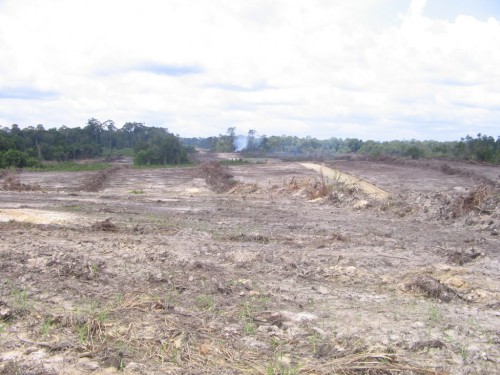
Governments of eight producer countries state that sustainability of agrofuels cannot be guaranteed
01 December 2008
Open Letter to MEPs:
Since EU target is conditional on sustainability, EU should drop the target
On 6th November, the governments of Argentina, Brazil, Colombia, Indonesia, Malaysia, Malawi, Mozambique and Sierra Leone wrote an Open Letter to The Council, Parliament and Commission of the European Communities, in which they made it clear that they strongly object to proposed sustainability standards for agrofuels. Those eight countries are amongst the main countries from which the EU is likely to import agrofuels and agrofuel feedstocks. In their letter, the eight governments complain that their countries cannot be expected to contribute to a 10% EU target for renewable energy for transport if the EU introduces indirect land-use change factors into green house gas (GHG) calculations as proposed in the sustainability standards adopted by the European Parliament’s ITRE Committee. The governments say that this „would make the production of agrofuels nearly impossible anywhere in the world“. They also reject the principle of social standards as well as many of the proposed environmental standards, as „reversing the burden of proof onto producers“.
The eight governments’ main line of argument can be re-stated as follows: if all the relevant criteria are taken into account, agrofuel production is not sustainable. We would agree with that conclusion.
At the same time, we strongly reject the eight governments’ suggestion that agrofuel expansion, supported by a 10% EU agrofuel target should nonetheless proceed. We note that many community and civil society organisations in the eight countries have spoken out strongly against the EU’s agrofuel policies. The EU has an obligation to respect and protect human rights beyond its borders.
The eight governments further note that the EU’s proposed conditions are incompatible with WTO provisions and hint at possible WTO action. This coincides with simultaneous threats by the European Commission of raising action under the WTO in future, in the context of the European Commission’s proposed strategy „to address EU critical needs for raw materials“ (tinyurl.com/5vbnpc). Such aggressive trade policies make it even less possible for other countries to ensure even minimum standards for agrofuel production. Trade cannot be allowed to override the need for sustainability.
When the EU proposed the target of 10% for agrofuels, it was made conditional on sustainability. We believe that sustainability criteria are impossible to correctly calculate, implement, monitor, or enforce. Major exporters are now indicating that they will not accept them. This would remove the condition on which the target was predicated.
One issue the countries do not mention, understandably, is the following draft EU text: „The Commission may decide that bilateral and multilateral agreements between the Community and third countries demonstrate that biomass, agrofuels and other bioliquids produced from raw materials cultivated in those countries comply with the environmental and social sustainability criteria in paragraphs 3 or 4 of Article 15.“
If adopted his text could enable bilateral and multilateral agreements to bypass any attempt to protect the environmental and social fabric from the potential ravages of agrofuel production. This would effectively remove the mandated link between the target and sustainability. There are already several bilateral agreements between EU member states and countries that signed the letter.
In view of the clear statement from major agrofuel exporter nations that they do not accept the proposed EU sustainability standards, we believe there is now no credible option but to drop the target and to agree an EU agrofuel moratorium, as already demanded by over 200 organisations from around the world.
Signed by:
Organisations: ADEV (Action pour le Developpement et la Vie), DR Congo AEFJN (Africa Europe Faith & Justice Network) African Biodiversity Network A SEED Europe, Netherlands Asociacion Cultural Mazzaribah, Spain Biofuelwatch, UK Borneo Project, US CADDE, Centre d’Action pour le Developpement Durable et l’Environment, Gabon Campaign for a Hydrogen Economy, UK Center for Encounter and active Non-Violence, Austria Corporate Europe Observatory, Netherlands CPDA – Confederation of Portuguese Environmental NGOs, Portugal Ecologistas en Acción (Spanish State) Econexus, UK Economic Justice and Development Organization (EJAD), Pakistan FIAN International FIAN-Netherlands Friends of the Earth Sierra Leone Gaia Foundation, UK Global Forest Coalition Netherlands Centre for Indigenous Peoples (NCIV), Netherlands NOAH (Friends of the Earth Denmark) Plane Stupid, UK Plataforma Transgenicos Fora, Portugal Pro-Papua, Netherlands QUERCUS, Associationfor Nature Conservation, Portugal Rainforest Saver Foundaton, UK Rettet den Regenwald e.V., Germany Society for Threatened Peoples International Sumatran Orangutan Society, UK Sunday Harvesters, India vision:teilen – eine franziskanische Initiative gegen Armut und Not e.V., Germany Watch Indonesia! Individuals: Emilie Baer, Netherlands Joost Brouwer, Netherlands Sister Madeleine Dierckx, Missionary Sisters of Africa, Lynn Finnigan Jessica Gatty, UK Matti Gronlund, Spain Dr Irina Herzog, Finland Prof. Patricia Howard, UK Alison Hunt, UK Frederic Malter, USA Dr Gunter Moeller, UK Rita Paczian, New Zealand Mavis Petrie, UK Marc Roberts, UK Oliver Smith,UK Nick Stockbridge, UK








